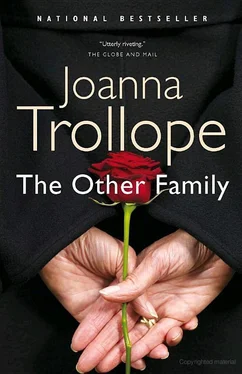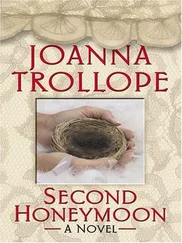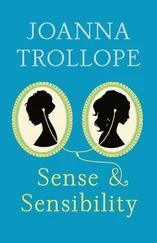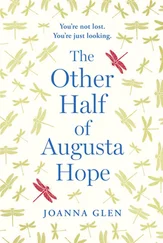Joanna Trollope - The Other Family
Здесь есть возможность читать онлайн «Joanna Trollope - The Other Family» весь текст электронной книги совершенно бесплатно (целиком полную версию без сокращений). В некоторых случаях можно слушать аудио, скачать через торрент в формате fb2 и присутствует краткое содержание. Жанр: Старинная литература, на английском языке. Описание произведения, (предисловие) а так же отзывы посетителей доступны на портале библиотеки ЛибКат.
- Название:The Other Family
- Автор:
- Жанр:
- Год:неизвестен
- ISBN:нет данных
- Рейтинг книги:5 / 5. Голосов: 1
-
Избранное:Добавить в избранное
- Отзывы:
-
Ваша оценка:
- 100
- 1
- 2
- 3
- 4
- 5
The Other Family: краткое содержание, описание и аннотация
Предлагаем к чтению аннотацию, описание, краткое содержание или предисловие (зависит от того, что написал сам автор книги «The Other Family»). Если вы не нашли необходимую информацию о книге — напишите в комментариях, мы постараемся отыскать её.
The Other Family — читать онлайн бесплатно полную книгу (весь текст) целиком
Ниже представлен текст книги, разбитый по страницам. Система сохранения места последней прочитанной страницы, позволяет с удобством читать онлайн бесплатно книгу «The Other Family», без необходимости каждый раз заново искать на чём Вы остановились. Поставьте закладку, и сможете в любой момент перейти на страницу, на которой закончили чтение.
Интервал:
Закладка:
She sat down in front of her screen. There were three hundred and seventy-four new e-mails from the website she had set up for Richie, and managed for Richie, and shielded Richie from. That was three hundred and seventy-four messages in the last two weeks, because she hadn’t checked for a fortnight, hadn’t felt she could bear to. Several, she noticed, were from the same person, the kind of people whose lives were lived almost entirely outside their own smal reality, and who had no shame in badgering on and on and on until they got a response.
Wel , Chrissie thought, there was no response. She’d mailed everyone whose address she had after he’d died, and again a few weeks later.
There was no more to say, and that was that. Their idol was dead and they would al have to find what solace they could from his music, from what he had left behind. She, Chrissie, was not going to let anyone appoint her keeper of the flame, and to make that perfectly plain she was going to delete the lot of them. She moved the computer mouse slightly on the mouse mat the girls had given her, bearing a picture of their father at the piano, head thrown back, eyes closed, singing, and three clicks later it was done. Al gone.
‘You do what you have to do,’ Sue had said exasperatedly to her the other day, fatigued by her indecisiveness. ‘Don’t keep asking me. Trust your instincts. You always have, so why change the habits of a lifetime at the very moment things are in free fal ?’
Chrissie stood up. She would leave the computer on, and clear more stuff out of it later. She would clear and clear until she could stop seeing Richie only through this thicket of complication and rancour, and could remember something, some smal thing, that was of consequence to her alone. Surely that was possible to do? Surely the last few months, and the disappointing years that had preceded them, couldn’t entirely obliterate everything of strength and value that had gone before?
She drifted into the sitting room. The girls had virtual y stopped using it, had taken to retreating to their rooms with their laptops, or, in Tamsin’s case, to the growing alternative domestic al ure of Robbie’s flat and his appreciation of what he insisted on cal ing a woman’s touch. Only her habitual chair looked inhabited, the cushions stil dented from last night’s television-watching, the magazines and files piled on the low table in front of it, a single empty wine glass balanced on a book. She would have to take it in hand, she would have to spruce and plump and polish, she would have to buy flowers and candles before the room could be shown to Mr Mundy. If she shrank from the idea of Mr Mundy’s appraising eye swivel ing round her sitting room, she shrank stil more from attempting to tel Tamsin that she would al ow it, but not yet. She couldn’t keep saying ‘Not yet’, Sue had told her. Not yet, taken to extremes, was what landed people in places where they had no choices any more. Was that what she wanted?
Was it? Did she real y want to be the kind of person, in fact, who was unable to stand up to her late husband’s first wife in a telephone cal , as she was very much afraid she had been?
She put her tea mug down beside the wine glass and made a half-hearted attempt to straighten the cushions in her chair. Once, she’d have done it briskly, late at night, before they went up to bed, so that the sitting room – the whole house, in fact – looked alert and ready to wake up to. Now, although she was trying very hard not to let any standards actual y slip, they were muted, they took more effort, there seemed less point in keeping the motor running. She wondered, vaguely, and apropos of nothing she had been preoccupied with before, if losing the business of running Richie had left as disorientating a blank in her life as his death itself had. Who was it, some government minister or someone, who’d said, ‘Work is good for you’?
‘Mum?’ Dil y said from the doorway.
Chrissie gave a little jump.
‘Heavens, I thought you were al out—’
‘I was upstairs,’ Dil y said. ‘D’you want a coffee?’
‘I’ve just had tea—’
Dil y looked around the room, as if she was remembering how it was.
‘Bit sad in here—’
‘I know. Where’s Amy?’
Dil y shrugged.
‘Dunno.’
‘Tamsin’s gone to Robbie’s.’
‘No change there, then—’
‘Dil y—’ Chrissie said.
Dil y stopped gazing round the room and looked at her mother.
‘Dil y,’ Chrissie said, ‘wil you come and look at the flat with me?’
Dil y said reluctantly, ‘Why me?’
‘Tamsin’s usual y at Robbie’s. Amy’s going – wel , you know where Amy’s going. And I don’t want to do this alone, I don’t, I real y don’t.’
She paused. Dil y had bent her head so that her pale hair had fal en forward to obscure her face.
‘Please,’ Chrissie said, ‘please come with me. Please – help me?’
There was a long silence. Then Dil y tossed her hair back and began to smooth it into a bunch. She smiled at her mother wanly.
‘Why not?’
Scott was humming. He’d put one volume of Rod Stewart’s American Songbook into his CD player and he was singing along to it. He’d opened the windows in his flat and hung his stripped-off duvet over the sil , as he’d once seen done in a Swiss vil age, on the only school trip he’d ever been on, when they’d been supposed to ski, but he and his gang had gone tobogganing instead, on plastic sledges, on snow packed as hard as stone.
The vil age had been half modern blocks of flats and half little chalets varnished the colour of caramel, with shutters and incredibly regimented log piles, and over the balconies of these chalets, in the bright, cold morning air, people hung quilts and bolsters, creating nursery-rhyme images of tidy housewifery and goose-feather beds. So now, in honour of Amy’s coming, Scott was airing his own duvet in ful optimistic view of the trains trundling over the Tyne Bridge.
Also in her honour, he had bought new bedlinen. It had taken him a whole Saturday morning to choose, wanting to make some effort but not too much, and he had come away with a set in grey-and-white striped cotton, which, he hoped, looked androgynous enough not to embarrass either of them. He had also bought new towels, and a bottle of pale-green liquid handwash and a raft of cans of Diet Coke. Al the girls in his office drank Diet Coke when they were having a brief respite from coffee and alcohol. If Amy didn’t drink it, the girls in the office would, after she’d gone, but at this moment Scott wasn’t dwel ing on after she’d gone. He was revel ing instead in her coming.
His high spirits had even carried him clean through a potential y enraging cal from his mother. She’d rung the evening after his bedlinen expedition to say, with undisguised triumph, that she had spoken to Amy’s mother – ‘ What ?’ Scott had shouted – and it was agreed that Amy should stay, in perfect propriety, in Percy Gardens.
‘You spoke to her?’
‘I did,’ Margaret said. Her voice was ful of satisfaction.
‘Wel ,’ Scott said, ‘I have to hand it to you. I real y do, Mother.’
‘Thank you.’
‘So, it’s al arranged—’
‘Yes,’ Margaret said. ‘I’m sorry to disappoint you, pet, but I’m sure you’l see it’s for the best.’
‘Wel ,’ Scott said casual y, ‘it’s not for long—’
‘Four nights.’
‘Oh no,’ Scott said, ‘just three.’
‘You said four nights—’
‘Did I? I don’t think so. Don’t want to overdo it, the first time.’
‘Four nights,’ Margaret said firmly. ‘Thursday to Monday. Four nights.’
‘We changed it,’ Scott said.
Читать дальшеИнтервал:
Закладка:
Похожие книги на «The Other Family»
Представляем Вашему вниманию похожие книги на «The Other Family» списком для выбора. Мы отобрали схожую по названию и смыслу литературу в надежде предоставить читателям больше вариантов отыскать новые, интересные, ещё непрочитанные произведения.
Обсуждение, отзывы о книге «The Other Family» и просто собственные мнения читателей. Оставьте ваши комментарии, напишите, что Вы думаете о произведении, его смысле или главных героях. Укажите что конкретно понравилось, а что нет, и почему Вы так считаете.












